The most stunning city of Europe shows off
its Baroque past in style.
It is said that first impressions last the
longest, so keep your eyes open just a slit if you ride out of Praha Ruzyne
airport during the rush hour. The cabbie might skirt the traffic and take a
bypass to reach the town centre, and the sight of Soviet-style functionality
along the way could turn the heart’s somersault of joy into a backflip ending
in a flat fall.
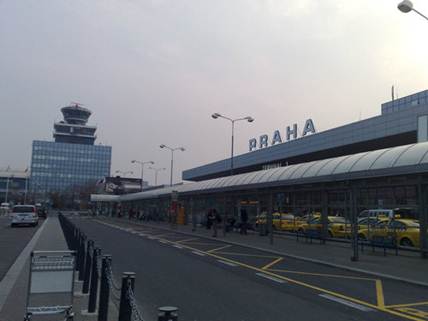
Praha
Ruzyne airport
However, it is also said that good things
come to those who wait the capital of former Bohemia proves the truth of this.
But first, a tip: before exiting the airport, smile at any fellow arrivals who
catch your eye. You have a 90 per cent probability of meeting them in the
historical centre of Prague; a few new friends cannot hurt.
Given its tiny size, the Czech Republic can
probably lay claim to a world record for having the most number of supremely
photogenic edifices per square kilometre. There are enormous castle complexes
all over the country in the south, Cesky Krumlov, with its famed Masquerade
hall of Rococo paintings that cause optical illusions; in the southeast, Zdar
nad Sazavou, an ecclesiastical complex in the shape of a 10-pointed star; in
the east, Kromeriz, with spectacular gardens and a collection of great European
art. The historical centre of Prague, a Unesco World Heritage site, has the
lion’s share of the astounding architecture seen around the country, and
everyone, locals and tourists alike, gravitates towards it.
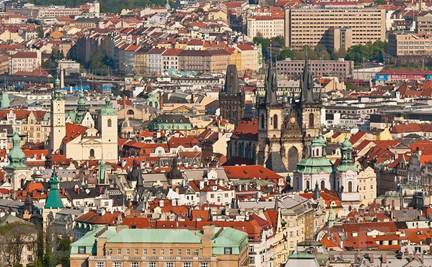
Overlooking
the historic Old Town in Prague, UNESCO World Heritage Site, Bohemia, Czech
Republic
This city centre has three main sections the
12th century Old Town (Stare Mesto); the 13th century
Lesser Quarter (Mala Strana); and the 14th century New Town (Nove
Mestro). On the left bank of the Vltava river, which cuts through the city, is
Mala Strana and the Prague Castle, the largest defined castle complex in the
world. On the right are the old Town, including the Jewish Quarters, and the
New Town, including the Vysehrad castle. The city’s focal point is the 15th
century Charles Bridge (Karluv Most), Baroque Christian statuary decorating its
sides.
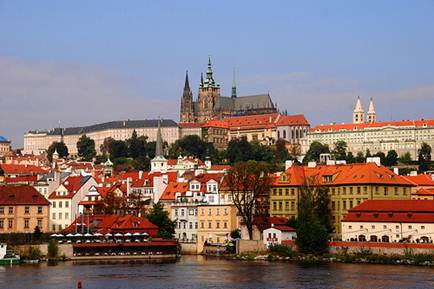
the
Prague Castle
At normal speed, it should take five
minutes to cross the Charles Bridge. But at any time of the day or night, the
crossing can take half-an-hour, as you will want to linger. In the day, the
bridge is choc-a-block with tourists and makeshift stalls of local artisans
selling paintings, jewellery and handicrafts. The best souvenir shopping in
Prague is to be had on this bridge, not in the dozens of shops selling Made in
China tat in the Old Town lanes. At night, the views on all sides are magic,
the yellow glow of the street lamps gilding everything. The jazz band that
plays to afternoon crowds on the bridge makes way now for classical violinists.
Stand here facing the Old Town and you see
two imposing structures in the distance on either side; they represent the
attrition that marked Czech life under German dominance. The golden-roofed
National Theatre (Narodni Divadlo), inaugurated in 1881, is the Czech people’s
assertion of their cultural independence under the Habsburgs. It took four
decades and aid from every Czech to build this magnificent opera house. In
retaliation, the German-speakers began work on their own cultural hub, and in
1888, the New German Theatre, now the Prague State Opera, opened for its first
show.
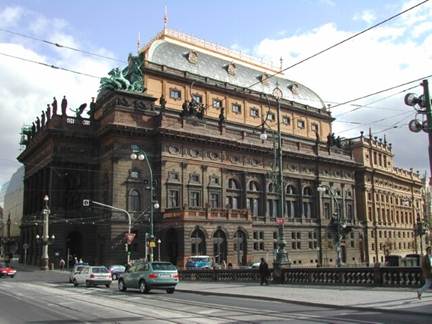
The
golden-roofed National Theatre (Narodni Divadlo)
Modern Prague has reinvented this legacy of
art and craftsmanship. The noted glass artist and architect Borek Sipek creates
mind-boggling pieces from enormous chandeliers to wine glasses that could
double as centerpieces even as the souvenir stores sell conventional Bohemian
crystal; E.daniely, one of the first labels to dress East European women in
designer togs after the fall of the Soviet Union, is still acquiring fans;
shelves at the design shop Modernista are stacked with some of European’s most
cutting-edge output; the lifestyle chain Manufaktura keeps a bit of “Czechness”
in everything from toys to heavenly bath and body products.
The creative philosophy extends to some of
the Prague hotels. The most interesting story is that of Augustine, a luxury
property on land owned by the adjacent Augustinian St Thomas Monastery. The
three-level Tower Suite, with 3600 views of the city, has been
constructed out of monks’ cells. Of the hotel’s two bars, one used to be the
refectory, and the other was the cellar of the monastery’s brewery. The
original 13th century building design is visible in many parts of
the hotel.
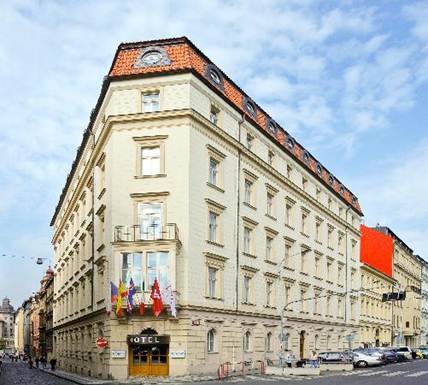
Hotel
Chopin Prague
Prague’s literary past is as important as
its architecture. The best-known name in this chapter is of Franz Kafka. The
author of The Metamorphosis and other stories born out of his surreal
imagination lived and died here, and worked as of all things an insurance
official! The chronicle of his tormented mind is told in a riverside museum.
Outside the darkness of Kafka’s psyche, the
town centre is dripping with warmth and charm. Walking around it endlessly is
one of the chief pleasures of a bright day. And people do, all the time. This
is where the probability of meeting the new arrival comes in. the lanes are
lined with cafes, where hours are whiled away over beer. Should you lock eyes
with someone nursing a pint alone, sit down across him, and start your own
Prague story.
Fact life
How to go:
Delhi Aeroflot via Moscow and Lufthansa via Munich have short layovers. Mumbai
Swissair via Zurich is the quickest. Turkish Arlines, from both cities, has a
layover of several hours.
Where to stay: two km from the centre, Lida Huest House has good, inexpensive
rooms. For a taste of the Baroque, try The Alchymist Residence Nosticova at the
town centre. The Icon Hotel near Wenceslas Square offers extreme comfort and
cool value.
What to do:
classical concerts are huge in Prague; venues include the gorgeous Municipal
House. Black light theatre is another attraction. Eat at Indian Jewel in the
Old Town for some cooked-to-perfection home fare. Pop into the Grand Café
orient to admire its Cubist structure and snack on Czech cake.